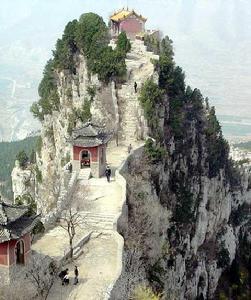
Located in the eastern part of Anhui Province bordering Jiangsu Province, Ma'anshan is on the south bank of the Yangtze River and a stop on the Nanjing-Wuhu Railway. It has become an industrial city with iron and steel as its major products.
Colorful Stones Rock (Caishiji)
Rising precipitously beside the rolling Yangtze River seven kilometers southwest of Ma'anshan City, Anhui Province, this rock used to be called Bull Islet Rock (Niuzhuji) because a legendary gold bull is said to have appeared here in ancient times.
The present name was adopted during the period of the Three Kingdoms (220-280) because the area abounded in colorful stones.
The rock occupies a position of strategic importance. Its scenery is dominated by pines, bamboos, and the steep cliffs of Cuiluo Hill.
Caishiji is one of the three most famous such rocks along the banks of the Yangtze River, the other two are Chenglingji in Yueyang, and Yanziji in Nanjing.
It was here that Li Bai wrote many immortal poems. There are such places of interest as Taibai Tower, the Memorial Hall to Li Bai, and the Tower to Catch the Moon.
Tomb of Libai
Lying at the foot of Mt. Qingshan southeast of Dangtu County, Ma'anshan, the Tomb of Li Bai (701-762), a great poet of the Tang Dynasty, covers an area of three hectares, in the shade of ancient pines and willow trees. Near the tomb there is a memorial hall named Taibai, which houses stone inscriptions of past dynasties and paintings and calligraphy by distinguished artists. Through the ages, numerous men of letters came to show their respect to Li Bai.
three hectares, in the shade of ancient pines and willow trees. Near the tomb there is a memorial hall named Taibai, which houses stone inscriptions of past dynasties and paintings and calligraphy by distinguished artists. Through the ages, numerous men of letters came to show their respect to Li Bai.
Green Snail Hill (Cuiluoshan)
This hill, which faces the Yangtze and the Niuzhu rivers seven kilometers southwest of the city, got its name because it is shaped like a snail. The huge Taibai Tower on the hill was dedicated to the memory of the famous Tang Dynasty poet Li Bai (701-762). It is said that after a drinking spree Li Bai plunged into the Yangtze in an attempt to catch the moon, only to drown. The terrace from which he leaped is called Catching the Moon Terrace (Zhuoyuetai). Fishermen fetched his cap and clothes from the river and buried them in a tomb on the hill.
